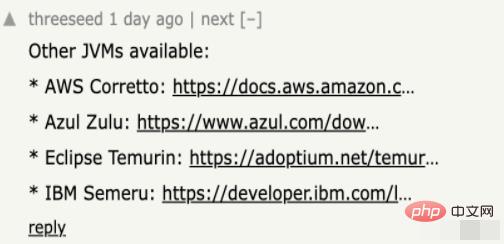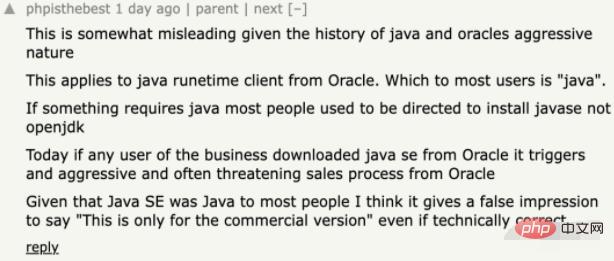 headlines
headlines
 Breaking news! You have to pay whether you use Java or not, and you are charged on a per-capita basis!
Breaking news! You have to pay whether you use Java or not, and you are charged on a per-capita basis!
Breaking news! You have to pay whether you use Java or not, and you are charged on a per-capita basis!
Friends who are still using Java SE (Standard Edition) , please note:
Oracle has quietly increased its price.
Starting from January 23, Java SE subscriptions will no longer be charged based on the number of users, but will be charged based on the number of company employees.
You read that right.
To give an exaggerated example, this means that in a company of 100 people, even if only one person is using Java SE, the others are not even programmers, you will also be charged a licensing fee of 100 people...

This operation made netizens stunned:
Oracle is committing suicide slowly.

Some people in the industry commented sharply:
Oracle deserves to be the leader of Silicon Valley.
Java is open source in principle. But since Oracle acquired SUN in 2010, it has been using Java for "legal blackmail" in an attempt to maximize profits.
Java was developed by SUN, which was acquired by Oracle for $7.4 billion in 2009. The acquisition was completed in 2010.
Oracle changes Java SE pricing model
What is the specific charging method? Oracle clearly marks the price.

also gave a very "intimate" example of calculating the price:
For a company with a total number of employees of For a company with 28,000 people, the annual subscription fee is 28,000 people × $6.75 × 12 months = $2.268 million (the more people, the greater the discount)~
Please note, When counting employees, you must include full-time employees, part-time employees, temporary workers, as well as outsourcing and consultants. Oh, and even if these people aren't using Java~


If a company has a total of 250 employees, only 20 of whom are Java developers, and the company has 8 single-socket servers with Java installed, according to the original charging standards, the company will have to pay Oracle ($2.5) every year ×20 ($25 × 8) × 12 = $3,000.
And if according to the new standard, this money suddenly becomes 45,000 US dollars per year (15 US dollars × 250 people × 12 months).
Good guy, it’s up 1400%.
And even if this company is a big Java company, with 250 people working on Java development, and there are 48 single-socket servers with Java installed in the company, it still costs 105%#. ##Money:
According to the old terms, the subscription fee is US$21,900/year; according to the new standard, the subscription fee is also US$45,000/year. Netizen: Oracle is indeed Oracle I don’t know what you think of this price increase. Nathan Biggs directly suggested: take a look at the free OpenJDK. After seeing the news, enthusiastic netizens also began to sort out their escape route silently: And Oracle’s sudden price increase without any warning obviously angered many people. Few netizens.
And Oracle’s sudden price increase without any warning obviously angered many people. Few netizens. 

But more "warnings" follow: Oracle has a dark history, so be careful.
When most people install Java, they will be directed to install Java SE instead of OpenJDK.

This is why many companies have banned Oracle download pages.

Having said that, does this matter have a big impact on you?

Hot AI Tools

Undresser.AI Undress
AI-powered app for creating realistic nude photos

AI Clothes Remover
Online AI tool for removing clothes from photos.

Undress AI Tool
Undress images for free

Clothoff.io
AI clothes remover

AI Hentai Generator
Generate AI Hentai for free.

Hot Article

Hot Tools

Notepad++7.3.1
Easy-to-use and free code editor

SublimeText3 Chinese version
Chinese version, very easy to use

Zend Studio 13.0.1
Powerful PHP integrated development environment

Dreamweaver CS6
Visual web development tools

SublimeText3 Mac version
God-level code editing software (SublimeText3)

Hot Topics
 1382
1382
 52
52
 Perfect Number in Java
Aug 30, 2024 pm 04:28 PM
Perfect Number in Java
Aug 30, 2024 pm 04:28 PM
Guide to Perfect Number in Java. Here we discuss the Definition, How to check Perfect number in Java?, examples with code implementation.
 Weka in Java
Aug 30, 2024 pm 04:28 PM
Weka in Java
Aug 30, 2024 pm 04:28 PM
Guide to Weka in Java. Here we discuss the Introduction, how to use weka java, the type of platform, and advantages with examples.
 Smith Number in Java
Aug 30, 2024 pm 04:28 PM
Smith Number in Java
Aug 30, 2024 pm 04:28 PM
Guide to Smith Number in Java. Here we discuss the Definition, How to check smith number in Java? example with code implementation.
 Java Spring Interview Questions
Aug 30, 2024 pm 04:29 PM
Java Spring Interview Questions
Aug 30, 2024 pm 04:29 PM
In this article, we have kept the most asked Java Spring Interview Questions with their detailed answers. So that you can crack the interview.
 Break or return from Java 8 stream forEach?
Feb 07, 2025 pm 12:09 PM
Break or return from Java 8 stream forEach?
Feb 07, 2025 pm 12:09 PM
Java 8 introduces the Stream API, providing a powerful and expressive way to process data collections. However, a common question when using Stream is: How to break or return from a forEach operation? Traditional loops allow for early interruption or return, but Stream's forEach method does not directly support this method. This article will explain the reasons and explore alternative methods for implementing premature termination in Stream processing systems. Further reading: Java Stream API improvements Understand Stream forEach The forEach method is a terminal operation that performs one operation on each element in the Stream. Its design intention is
 TimeStamp to Date in Java
Aug 30, 2024 pm 04:28 PM
TimeStamp to Date in Java
Aug 30, 2024 pm 04:28 PM
Guide to TimeStamp to Date in Java. Here we also discuss the introduction and how to convert timestamp to date in java along with examples.
 Java Program to Find the Volume of Capsule
Feb 07, 2025 am 11:37 AM
Java Program to Find the Volume of Capsule
Feb 07, 2025 am 11:37 AM
Capsules are three-dimensional geometric figures, composed of a cylinder and a hemisphere at both ends. The volume of the capsule can be calculated by adding the volume of the cylinder and the volume of the hemisphere at both ends. This tutorial will discuss how to calculate the volume of a given capsule in Java using different methods. Capsule volume formula The formula for capsule volume is as follows: Capsule volume = Cylindrical volume Volume Two hemisphere volume in, r: The radius of the hemisphere. h: The height of the cylinder (excluding the hemisphere). Example 1 enter Radius = 5 units Height = 10 units Output Volume = 1570.8 cubic units explain Calculate volume using formula: Volume = π × r2 × h (4
 How to Run Your First Spring Boot Application in Spring Tool Suite?
Feb 07, 2025 pm 12:11 PM
How to Run Your First Spring Boot Application in Spring Tool Suite?
Feb 07, 2025 pm 12:11 PM
Spring Boot simplifies the creation of robust, scalable, and production-ready Java applications, revolutionizing Java development. Its "convention over configuration" approach, inherent to the Spring ecosystem, minimizes manual setup, allo


